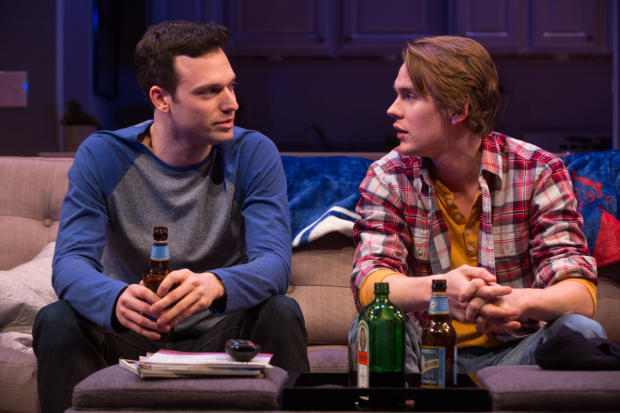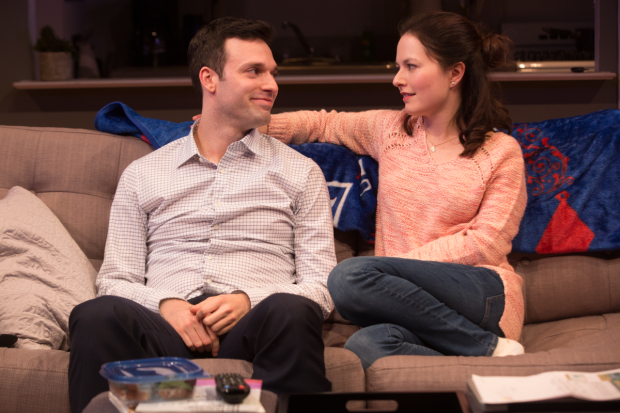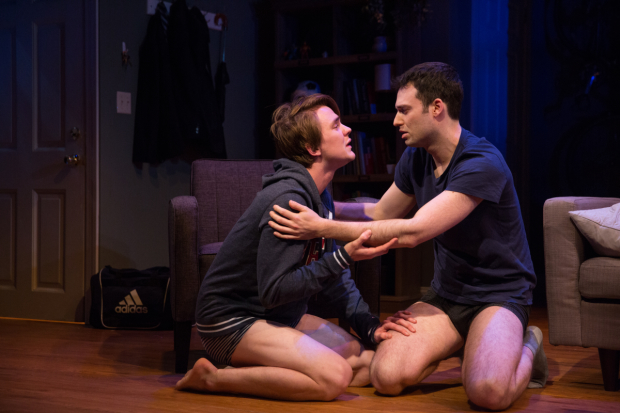
(© Matthew Murphy)
"The whole rest of your identity just gets subsumed by this one, like, vitiating thing," protests Ben, the protagonist of Scott Elmegreen and Drew Fornarola's play Straight, now receiving its world premiere at the Acorn Theatre. That "vitiating thing" is his desire to have sex with men, a trait that would put him firmly in the LGBT camp in the eyes of most Americans. But Ben refuses to be politically defined by his sexual behavior and he's not alone: An increasing number of men and women (especially millennials) reject the gay-straight dichotomy, a fact that the playwrights acknowledge, but never really build upon.
At the top of the play, Ben (Jake Epstein) and Chris (Thomas E. Sullivan) awkwardly sit on Ben's couch watching football and sipping beer. Ben is a 26-year-old financier and Chris is a 20-year-old student at Boston College. This is their first time meeting for…whatever…and Ben is clearly nervous. This angst is heightened by the existence of Ben's long-term girlfriend, Emily (Jenna Gavigan), a scientist conveniently researching the relationship between genetics and environment. She knows nothing about his proclivities. The two men secretly begin a passionate affair while Emily wonders why after five years her boyfriend still hasn't moved in with her. He would, but then how is he going to see his boyfriend?

(© Matthew Murphy)
Elmegreen and Fornarola clearly want to talk about the evolving sexual spectrum: Why would young men reject the gay-straight continuum? In a time of increased political acceptance, are such narrowly defined sexualities even necessary? Why adopt identities to coincide with our behavior at all? Unfortunately, the authors have not found a way to clearly integrate these questions into stage action. Instead, they make a few swipes at the discussion during a drinking-and-talking scene. "A guy is straight by default. If he does something with another guy, he goes over to gay, and that's it," Ben drunkenly complains to Chris about our society's absolutism when it comes to same-sex experimentation. He's not wrong to ignite that conversation, but it’s disappointing that this scratch at the surface is the only time the play really engages with the underlying issues.
As Jane Ward writes in Not Gay, her recently released study of homosexual behavior between straight men, "While attractive white heterosexual women…are forgiven, if not celebrated, for their forays into same-sex coupling, men are offered a different, far more limited set of possibilities." Indeed, the character of Ben offers a golden opportunity to explore such double standards and the delicious ambiguities of human sexuality they obfuscate. Instead, he is reduced to being just your garden-variety closet case, struggling to come to terms with the love that dare not speak its name.
It's a role that Epstein plays well: the handsome and charming boyfriend with a secret. He smothers Emily with compensatory kisses and grand gestures. "Oh, my God — the squirrels!" she claps her cupped hands together like an adorable rodent when he tells her that he booked her dream room at a rustic bed-and-breakfast. The very funny Gavigan protects Emily in a shell of cutesy humor that feels authentic to both the text and her generation. Handing him a sandwich in Tupperware, she seems more like his mother than his girlfriend. We're not surprised to learn that they met in a college a cappella group.
In contrast to those sexless interactions, the chemistry between Epstein and Sullivan is palpable. Epstein looks like a hungry animal when they make out. Sullivan teases him with his smoky voice and villainous eyes, traits that make him look and sound much older than his alleged 20 years.

(© Matthew Murphy)
Director Andy Sandberg directs this competent cast to believable performances, despite his frustrating choice to stage nearly everything on the couch downstage center. Scenic designer Charlie Corcoran fabricates a realistic dwelling for a finance bro: A framed football jersey hangs above a bookshelf featuring textbooks and action figures. The color scheme is slate gray. Grant Yeager puts on a beautiful show with the lights over the bar and kitchen during the scene transitions. This is underscored by Will Van Dyke's original electronic music, which wouldn't sound out of place in a revival of Proof. Sandberg's choreography saves these transitions from being completely ornamental: During one, Ben makes out with Chris and then rapidly switches to Emily, telling the story of a lying, cheating, self-loathing homosexual.
Of course, people like Ben really do exist, but it feels like well-worn territory in the theater. Ben describes his childhood crush, Mike, and it's hard not to hear Brick waxing nostalgic about Skipper in Cat on a Hot Tin Roof (first performed on Broadway in 1955). Considering that Ben is an unmarried, financially independent adult with no kids living in Boston (a place gays could wed as far back as 2004), it's hard to think of this as anything more than needless, low-stakes melodrama. In 2016, the off-Broadway audience deserves something far more challenging.









